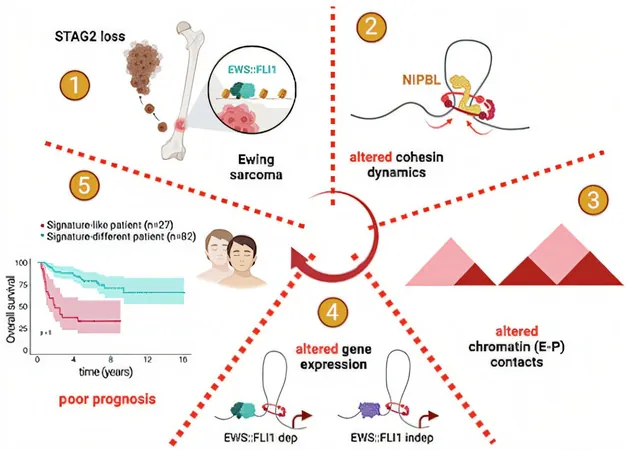
New Genetic Insights Unveil Reasons Behind Ewing Sarcoma's Aggressiveness
2024-11-29
Author: Yu
Recent Advancements in Genetic Research
Recent advancements in genetic research have shed light on the aggressive nature of Ewing sarcoma, a rare but devastating tumor that primarily affects children and young adults. According to studies, the incidence rate of this cancer is alarmingly low, with approximately nine to ten cases per million inhabitants each year. However, its aggression is troubling, as 25% of patients do not respond adequately to standard treatments and often suffer from relapses.
Pivotal Study by Ana Losada
A pivotal study led by Ana Losada, the head of the Chromosomal Dynamics Group at Spain's National Cancer Research Center (CNIO), has uncovered crucial mechanisms that intensify the aggressiveness of Ewing sarcoma. Published in EMBO Reports, the research points to various genetic alterations that encourage metastasis and result in poorer patient prognoses. Notably, the study identifies potential biomarkers and therapeutic targets that could lead to new treatment strategies.
Mechanism of Ewing Sarcoma
Ewing sarcoma arises from an abnormal fusion of two genes, creating an oncogene responsible for stimulating tumor growth. While previous research indicated that a lack of a protein named STAG2 worsens the effects of this oncogene, Losada’s latest findings reveal that the absence of STAG2 also disrupts the expression of numerous other genes, independently of the oncogene’s influence.
Role of STAG2 in Cellular Function
STAG2 is part of the cohesin protein complex crucial for cell division and gene expression regulation. This complex, discovered by Losada in the late 1990s, plays a vital role when cells divide, ensuring accurate DNA replication. During this process, chromosomes form an X-shape and are held together by cohesin rings at their centromeres.
When cohesin functions are compromised, such as in the case of STAG2 loss, chromosomes fail to fold properly, causing significant errors in gene expression. Losada notes, "Without STAG2, the cohesin complex struggles to maintain physical connections that assist in the transcription of numerous genes, leading to aberrations that can render cells more aggressive."
Investigating Immune Responses and Genome Stability
The study also highlights the significance of identifying additional genes influenced by STAG2 absence, suggesting an intriguing line of inquiry into how these genes contribute to tumor aggressiveness. Future research may focus on comparing immune responses in Ewing sarcoma patients with and without STAG2 deficiencies, potentially revealing how certain tumors evade immune detection—a critical insight for advancing immunotherapy options.
Moreover, the loss of STAG2 could compromise the integrity of the genome itself, as cohesin is also responsible for maintaining genomic stability. This suggests that multiple factors could be at play in the augmented aggressiveness associated with STAG2 loss, further complicating the disease's prognosis.
Conclusion and Future Research
As research continues, these findings hold promise for reshaping treatment approaches and guiding new therapeutic developments for those battling Ewing sarcoma. With scientists dedicated to understanding the complex genetics behind this cancer, we may soon see a brighter future for patients facing this formidable disease. Stay tuned as we bring you the latest updates on this groundbreaking research!




 Brasil (PT)
Brasil (PT)
 Canada (EN)
Canada (EN)
 Chile (ES)
Chile (ES)
 España (ES)
España (ES)
 France (FR)
France (FR)
 Hong Kong (EN)
Hong Kong (EN)
 Italia (IT)
Italia (IT)
 日本 (JA)
日本 (JA)
 Magyarország (HU)
Magyarország (HU)
 Norge (NO)
Norge (NO)
 Polska (PL)
Polska (PL)
 Schweiz (DE)
Schweiz (DE)
 Singapore (EN)
Singapore (EN)
 Sverige (SV)
Sverige (SV)
 Suomi (FI)
Suomi (FI)
 Türkiye (TR)
Türkiye (TR)